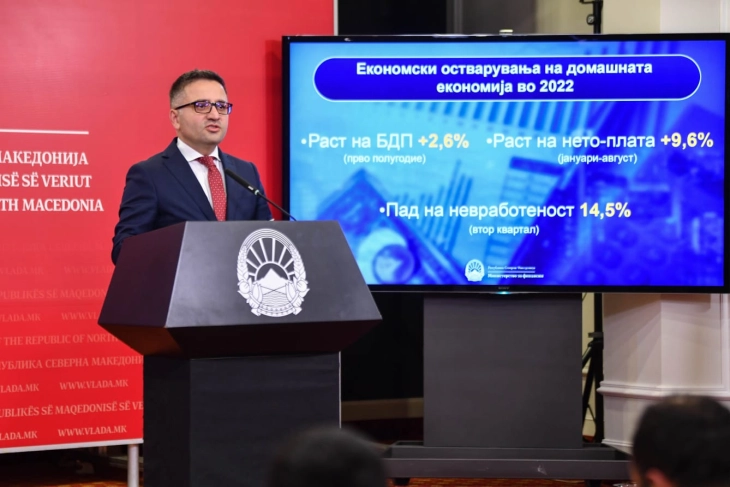Draft budget 2023 projects economic growth of 2.9%, inflation 7.1%

Skopje, 2 November 2022 (MIA) – The 2023 draft budget, which the Government adopted on Wednesday, projects economic growth of 2.9 percent. Growth of economic activity will continue to be driven by domestic demand. The inflation rate is expected to gradually stabilize and is projected at 7.1 percent.
Total revenues in the draft budget are planned at a level of Mden 282 billion and are 14.8 percent higher compared to 2022, whereas expenditures are at a level of Mden 324.8 billion, i.e. 12.6 percent higher compared to 2022. The budget deficit is at a level of 4.6 percent of the planned GDP.
Finance Minister Fatmir Besimi told a press conference on Wednesday that the aim of the draft budget, prepared in accordance with the new Law on Budgets, is to maintain economic growth, carry out regularly all state obligations and support reforms and European integration processes.
“Amid a global crisis, drafting the budget remains a challenge for every country. At a global level, economy will see slow growth, and the same applies to the growth of the economy of the European Union, which is expected to be 3.2 percent this year, and 0.7 percent next year. This is also reflected in the growth dynamics of our economy,” Besimi said.
According to Besimi, next year’s budget contains the key elements of the medium-term fiscal policy, i.e. the commitment to gradual fiscal consolidation, maintenance of macroeconomic stability and acceleration of economic growth.
The 2023 budget is also based on the golden rule in economics – capital expenditures should be higher than the budget deficit.
Capital expenditures are planned at a level of about Mden 48.9 billion, i.e. about 52.3 percent higher compared to the plan for 2022, and it is planned to provide funds from several sources to finance investments - budget funds, IPA funds and loans. They are intended to intensify the implementation of infrastructure projects, i.e. for investments in road and railway infrastructure, energy and communal infrastructure, as well as capital investments to improve conditions in the health, educational and social systems, agriculture, culture, sports, environmental protection and judiciary.
Current expenditures are planned in the amount of Mden 275.9 billion and are intended for regular payment of salaries to employees in the public sector, regular payment of pensions, guaranteed minimum income and other social benefits, payment of subsidies in agriculture, support of small and medium enterprises, support and subsidies for innovative activities, as well as support for the energy sector.
“Expenses for the payment of salaries are projected according to current legal solutions and amount to Mden 34.9 billion. In 2023, the commitment to optimize public sector employees will continue, while also applying the new methodology for salaries in the public sector,” said Besimi.
In the medium term, normalization of global movements, stabilization of global supply chains and growth of economic activity among main trade partners is expected. According to projections, the average growth of the domestic economic activity in the period 2023-2027 will reach 4.6 percent, while as of 2025, growth will reach a rate of 5 percent. The budget deficit is expected to be up to 3 percent by 2026, and below three percent in 2027. External debt is expected to be below 60 percent.







